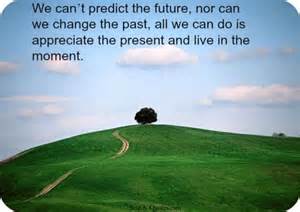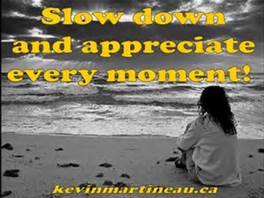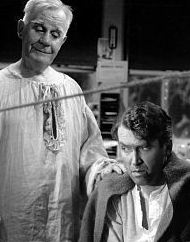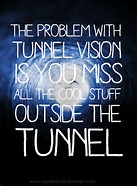
William Shatner (an American actor who was the original Star Trek captain) says that one of the messages in his memoir Live Long And…? is “Say yes to the experience of life.” I came across that gem on the heels of watching the Bedford County Players’ production of the Christmas classic It’s A Wonderful Life. (If not familiar with It’s A Wonderful Life, it is a 1946 American Christmas fantasy comedy-drama film produced and directed by Frank Capra, based on the short story and booklet The Greatest Gift, which Philip Van Doren Stern wrote in 1939 and published privately in 1945. The story centers on George Bailey who has given up his dreams in order to help others, and whose imminent suicide on Christmas Eve brings about the intervention of his guardian angel, Clarence Oddbody. Clarence shows George all the lives he has touched, and how different life in his community of Bedford Falls would be if he had never been born. The story highlights hope, redemption, and finding yourself and your worth.)

George Bailey was leading a wonderful and very meaningful life but he didn’t realize it. (I think many of us feel that same way at times.) When George’s Uncle Billy misplaces $8,000 George feels responsible and unable to come with funds, he despairs and feels with the value of his life insurance policy, he is worth more dead than alive. (Maybe not to the degree of George Bailey, but many of us can relate to feeling rock bottom when things in our life seem so out of control.)

With the help of divine intervention in the form of a guardian angel as well as the support of family and friends, George is able to see that he has had a profound positive influence on so many people and on the direction the community of Bedford Falls has taken.

 Like George, we sometimes need a seismic event to help us see the good, the positive in our own lives. But, it shouldn’t take that for us to have a wonderful life; for us to “say yes to the experience of life.” If we focus on living a meaningful life day in and day out, we will be better positioned to truly experience life in a wonderful way. A meaningful life is one that is grounded in a sense of purpose that goes beyond our day-to-day routines. Living a meaningful life involves authenticity, purpose, connection, compassion, living with intention in the present moment (mindfulness), and positive thinking. This week, we will explore these six components in an effort to help us live meaningfully and to say yes to the experience of life.
Like George, we sometimes need a seismic event to help us see the good, the positive in our own lives. But, it shouldn’t take that for us to have a wonderful life; for us to “say yes to the experience of life.” If we focus on living a meaningful life day in and day out, we will be better positioned to truly experience life in a wonderful way. A meaningful life is one that is grounded in a sense of purpose that goes beyond our day-to-day routines. Living a meaningful life involves authenticity, purpose, connection, compassion, living with intention in the present moment (mindfulness), and positive thinking. This week, we will explore these six components in an effort to help us live meaningfully and to say yes to the experience of life.
AUTHENTICITY. St. Francis de Sales (late 16th/early 17th century Bishop of Geneva who is honored as a saint in the Anglican and Catholic churches and who is known for his writings on the topic of spiritual direction and spiritual formation) says it best: “Be who you are and be that well.” We just need to be ourselves (and not an imitation of someone else). When we don’t worry about what others think, we can live more freely and we have a far better chance of living a life that is meaningful.

PURPOSE. Having a purpose (and one that reflects our principles and values) influences our ability to live a meaningful life. Is your purpose in life to teach others, inspire or motivate others, help others, lead others, serve others, heal others…? What can you do to use/share to the fullest your skills, talents, or strengths? What gives you a reason to get out of bed each morning and get on with the day?

CONNECTION. Having a connection with others – family, friends, colleagues – helps provide a sense of purpose in our lives which in turn leads to a more meaningful life.

COMPASSION. When we have empathy for others – when we see things with the eyes of another, listen with the ears of another, and feel with the heart of another – we are able to better understand what others are dealing with or going through. And when we want to do something to alleviate that pain or distress, we exemplify compassion. When we do help others, our own feelings of purpose and meaning are elevated. (A side benefit is we are often grateful for what we have when we see with what others are struggling.) What compassion does for us personally is beautifully illustrated in It’s A Wonderful Life. George Bailey needed an external force to remind him of the difference he made in the lives of others and how that truly added meaning to his life.

 MINDFULNESS. Abraham Joshua Heschel (a Polish-born American rabbi and one of the leading Jewish theologians and Jewish philosophers of the 20th century) said, “Life is routine and routine is resistance to wonder.” I would add, “Routine keeps us from realizing what is most meaningful moment-to-moment.” (Think George Bailey again.) There are always moments in our daily life that often go unnoticed that might be fleeting, yet meaningful. Sometimes we have to break out of our routines to realize the meaning behind things. And, sometimes it takes an external force (think Clarence the angel helping George Bailey) to see the meaning in aspects of our lives we take for granted or never give a second thought. So, what is mindfulness? Mindfulness is the intentionally-focused awareness of one’s immediate experience; it is being grounded in the present moment.
MINDFULNESS. Abraham Joshua Heschel (a Polish-born American rabbi and one of the leading Jewish theologians and Jewish philosophers of the 20th century) said, “Life is routine and routine is resistance to wonder.” I would add, “Routine keeps us from realizing what is most meaningful moment-to-moment.” (Think George Bailey again.) There are always moments in our daily life that often go unnoticed that might be fleeting, yet meaningful. Sometimes we have to break out of our routines to realize the meaning behind things. And, sometimes it takes an external force (think Clarence the angel helping George Bailey) to see the meaning in aspects of our lives we take for granted or never give a second thought. So, what is mindfulness? Mindfulness is the intentionally-focused awareness of one’s immediate experience; it is being grounded in the present moment.
When we operate on auto-pilot and fill our days with the routine, we often tune out much going on around us. We don’t see the gorgeous sunrise or the beauty of the autumn leaves or the smile something we did brought to the face of another. But, if in our daily routine we take time to savor what is happening around us – if we take time to appreciate the present moment – then routine moments will become meaningful moments.

 POSITIVE THINKING. Attitude is a mental position relative to a way of thinking or being; a leaning toward that which you believe. A positive attitude is, therefore, the tendency to be in an optimistic, hopeful state of mind. A positive attitude manifests itself in positive thinking.
POSITIVE THINKING. Attitude is a mental position relative to a way of thinking or being; a leaning toward that which you believe. A positive attitude is, therefore, the tendency to be in an optimistic, hopeful state of mind. A positive attitude manifests itself in positive thinking.
Positive thoughts generate positive feelings and attract positive life experiences. All of this helps us cope more easily with the daily affairs of life. Positive thoughts bring optimism into our lives and make it easier to avoid worry and negative thinking. With a positive attitude we see the bright side of life, become optimistic and expect the best to happen.
Positive thinking gives us power over our circumstances. It puts us in control and diminishes any power our circumstances have over us. Believing that we can overcome anything is half the battle. That belief gives us confidence. That belief steers us away from doubts which can immobilize us and turn our attention away from solutions. That belief helps keep our attention on whatever the issue, whatever the challenge is. (Think again of George Bailey and his lack of positive thinking just before Clarence entered his life and what impact that was having on him. Think of George’s family and all on whom George had some type of impact. They were a very positive thinking group.) If we let positive thinking guide us, it is easier to glean the meaning from daily activities. It is easier to say yes to all of life’s experiences because we work from a foundation that keeps us uplifted and willing to face challenges.

This article posts on December 24, 2018. December 24 is the day George Bailey in It’s A Wonderful Life learns just how wonderful his life really is. As we head into the final seven days of the year and begin to turn our thoughts and attention to a new year, we should all resolve to “say yes to the experience of life.” We should resolve to lead a meaningful life in the new year by being true to ourselves (authentic), having a purpose, staying connected to others, showing compassion, living with intention in the present moment (mindfulness), and thinking positively. Make 2019 an amazing year, one full of meaning, wonder, and experiences that bring us moments of awe!










